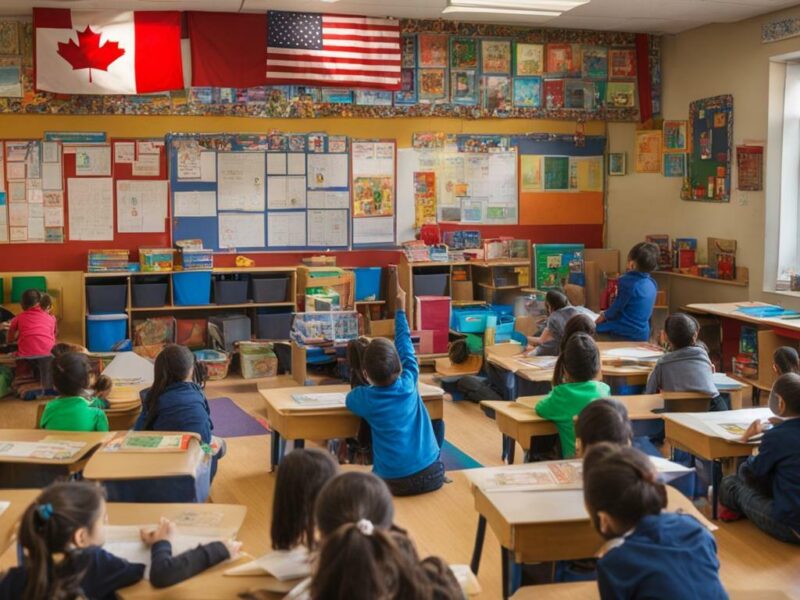Are you interested in pursuing a career in teaching and education in Canada? Discover the various job opportunities available across the country. Canada’s provincial and territorial governments operate their own school systems, offering a range of teaching positions in different regions.
Kindergarten education is available for children around the age of four or five, followed by primary and secondary education from grades one to 12. If you aspire to become a teacher in Canada, you will typically need a bachelor’s degree in Education and a provincial certificate. It’s recommended to start the certification process before arriving in Canada. Other factors that may be considered for eligibility include recent teaching experience, proficiency in English or French, familiarity with the Canadian education system, and fitness to teach. Certain teaching positions may also require supervised student teaching and specialization in particular subjects.
The salary for teaching jobs in Canada varies by province. A recent study revealed that Winnipeg offers the highest teacher’s salary, with approximately $102,000 per year for candidates with around 10 years of experience. On the other hand, Montreal has the lowest salary, with qualified candidates earning approximately $82,500 per year with similar experience.
The demand for teaching jobs in Canada also varies by province. Quebec, British Columbia, and the Northwest Territories have a good chance of finding work, while opportunities in Ontario are more limited.
To facilitate your search for teaching jobs in Canada, resources such as Moving2Canada are available, offering job search assistance, tips for writing cover letters and preparing for job interviews, and a jobs board with listings. Additionally, there are teaching opportunities abroad in over 40 countries, including ESL teaching jobs, through international schools, government programs, universities, and language colleges.
In addition to the diverse job opportunities, Canada’s education system is well-regarded for its high quality. The country is home to top universities, research institutions, elementary and secondary schools, post-secondary institutions, and vocational schools. Furthermore, online learning and distance education options are also available to cater to different educational needs.
Key Takeaways:
- Teaching and education jobs are available across Canada, with opportunities varying by province.
- Requirements to become a teacher in Canada typically include a bachelor’s degree in Education and a provincial certificate.
- The salary for teaching jobs in Canada varies by province, with Winnipeg offering the highest salary and Montreal the lowest.
- The demand for teaching jobs in Canada varies by province, with Quebec, British Columbia, and the Northwest Territories having better chances of finding work.
- Resources like Moving2Canada provide assistance in finding teaching jobs, and there are also teaching opportunities abroad through international schools, government programs, universities, and language colleges.
- Canada’s education system is known for its high quality, with top universities, research institutions, and various levels of education available.
Teaching and Education System in Canada
The Canadian education system encompasses kindergarten education for children around the age of four or five, followed by primary and secondary education from grades one to 12. This system provides a comprehensive and structured approach to learning, ensuring that students receive a well-rounded education.
In Canada, education is primarily a responsibility of the provincial and territorial governments. Each province and territory has its own school system, curriculum, and regulations for teaching jobs. This decentralized approach allows for flexibility and tailored education programs based on the needs of the local communities.
Primary and secondary education in Canada focuses on core subjects such as language arts, mathematics, science, and social studies. In addition to these subjects, students may also have the opportunity to explore areas such as physical education, music, art, and technology. This broad curriculum aims to foster intellectual growth, creativity, critical thinking, and social development.
Kindergarten Education
Kindergarten education is an integral part of the Canadian education system. It serves as an introduction to formal schooling and is designed to provide children with a smooth transition into primary education. Kindergarten programs focus on developing social skills, basic literacy, numeracy, and a love for learning. Through play-based activities, children have the opportunity to develop their cognitive, motor, and communication skills in a nurturing and inclusive environment.
| Grade | Age Range |
|---|---|
| Kindergarten | Around 4-5 years old |
| Primary Education | Grades 1-6 (Around 6-12 years old) |
| Secondary Education | Grades 7-12 (Around 12-18 years old) |
The Canadian education system prioritizes the well-being and success of its students. It upholds high standards of education, fostering an inclusive and safe learning environment that encourages students to reach their full potential. With a focus on academic excellence, critical thinking, and personal development, the Canadian education system prepares students for further studies, career opportunities, and active participation in society.
Requirements to Become a Teacher in Canada
To become a teacher in Canada, you typically need a bachelor’s degree in Education and a provincial certificate, but there are other factors that may impact your eligibility as well. It is recommended to start the certification process before arriving in Canada to ensure a smooth transition into the Canadian education system.
Here are the key requirements to become a teacher in Canada:
- A bachelor’s degree in Education: This degree provides the foundational knowledge and skills necessary for teaching in Canada. It covers subjects such as curriculum development, classroom management, and educational psychology.
- A provincial certificate: Each Canadian province or territory has its own certification requirements. You will need to meet the specific criteria set by the province where you intend to teach. This may include completing additional coursework, passing certification exams, and undergoing a criminal background check.
- Teaching experience: While not always mandatory, having teaching experience can enhance your chances of securing a teaching job in Canada. It demonstrates your practical knowledge and skills in the classroom.
- Proficiency in English or French: As Canada is a bilingual country, proficiency in either English or French is essential for teaching positions. You may be required to demonstrate your language proficiency through standardized tests or interviews.
- Fitness to teach: Teachers are expected to uphold high ethical and professional standards. You may need to provide evidence of good character, personal suitability, and a commitment to lifelong learning.
In addition to these requirements, supervised student teaching and specialization in certain subjects may be necessary for specific teaching positions. It is important to research the specific requirements of the province or territory where you plan to teach to ensure you meet all necessary criteria.
Table 1: Provincial Certification Requirements
| Province | Certification Requirements |
|---|---|
| Alberta | Bachelor’s degree in Education, completion of teacher education program |
| British Columbia | Bachelor’s degree in Education, completion of teacher education program, successful completion of the required professional development program |
| Ontario | Bachelor’s degree in Education, completion of teacher education program, passing the Ontario Teacher Qualifying Test |
| Quebec | Bachelor’s degree in Education, completion of an accredited teacher education program, fluency in French |
| Saskatchewan | Bachelor’s degree in Education, completion of teacher education program, passing the Saskatchewan Professional Teachers Certification Qualification Examination |
Specialization and Teaching Positions
In addition to the necessary qualifications, some teaching positions in Canada may require supervised student teaching and specialization in certain subjects. Supervised student teaching provides aspiring teachers with valuable hands-on experience in the classroom, allowing them to apply what they have learned in their education programs.
Specialization in certain subjects is often required for teaching positions in specific areas such as science, mathematics, or language arts. This specialization ensures that teachers have a deep understanding of the subject matter they will be teaching and are equipped to provide high-quality instruction to their students.
For example, a science teacher may need to specialize in biology, chemistry, or physics, while a language arts teacher may specialize in English literature or creative writing. Having expertise in a specific subject allows teachers to deliver engaging lessons, facilitate meaningful discussions, and provide targeted support to their students.
| Subject | Specialization Required |
|---|---|
| Science | Biology, Chemistry, Physics |
| Mathematics | Algebra, Calculus, Geometry |
| Language Arts | English Literature, Creative Writing |
Benefits of Specialization and Supervised Student Teaching
- Enhances teachers’ knowledge and understanding of specific subjects
- Enables teachers to provide targeted instruction and support to their students
- Increases teachers’ confidence and effectiveness in the classroom
- Prepares teachers for the diverse needs and challenges they may encounter
Specialization in a specific subject and supervised student teaching are vital components of teacher preparation, ensuring that educators are well-equipped to meet the demands of their roles and provide an excellent education to their students.
Salary Range for Teaching Jobs in Canada
The salary for teaching jobs in Canada varies depending on the province, with Winnipeg offering the highest salary and Montreal having the lowest salary for qualified candidates. According to a recent study, teachers with approximately 10 years of experience in Winnipeg can expect to earn an average salary of around $102,000 per year. On the other hand, in Montreal, qualified candidates with similar experience can expect a salary of about $82,500 per year.
Table 1 provides an overview of the salary ranges for teaching jobs in different provinces across Canada:
| Province | Highest Salary | Lowest Salary |
|---|---|---|
| Winnipeg | $102,000 | – |
| Toronto | $98,500 | – |
| Calgary | $90,000 | – |
| Vancouver | $88,000 | – |
| Edmonton | $86,500 | – |
| Ottawa | $84,000 | – |
| Montreal | – | $82,500 |
It’s important to note that these salary ranges are approximate and can vary depending on factors such as years of experience, qualifications, and the specific school district. Teachers in certain provinces may also be eligible for additional benefits and allowances.
Ultimately, when considering teaching jobs in Canada, it’s essential to research the salary range specific to the province and district you are interested in. This will help you make informed decisions regarding your career path in the education sector.
Demand for Teaching Jobs in Canada
The demand for teaching jobs in Canada varies by province, with some provinces offering good chances of finding work while others have more limited opportunities. If you are considering a teaching career in Canada, it is important to research the demand in different regions to maximize your chances of securing a position.
Quebec, British Columbia (B.C.), and the Northwest Territories are known to have a good demand for teachers. These provinces often have open positions and actively recruit educators. In Quebec, for example, the government has implemented initiatives to address teacher shortages, creating favorable conditions for job seekers in the education field. Similarly, B.C. and the Northwest Territories offer opportunities for those looking to start or further their teaching career.
On the other hand, Ontario, being one of the most populous provinces in Canada, tends to have a higher competition for teaching positions. While there may be limited opportunities compared to other provinces, it is still possible to find teaching jobs in Ontario. It is important to research the specific regions within the province as certain areas may have a higher demand for teachers.
| Province | Demand for Teaching Jobs |
|---|---|
| Quebec | Good |
| B.C. | Good |
| Northwest Territories | Good |
| Ontario | Limited |
Having a clear understanding of the demand for teaching jobs in different provinces can help you plan your career path and make informed decisions about where to focus your job search. It is recommended to explore various resources, such as job boards and education department websites, to stay updated on available opportunities.
Resources for Finding Teaching Jobs in Canada
If you’re looking for teaching jobs in Canada, there are resources available to assist you, such as Moving2Canada, which provides job search assistance and useful tips. Whether you’re a new graduate or an experienced educator, these resources can help you navigate the job market and find the right teaching position for you.
One of the main features of Moving2Canada is their comprehensive jobs board, where you can find a wide range of teaching job listings across the country. The board is regularly updated with new opportunities, making it a valuable resource for job seekers. You can easily search for teaching positions by location, subject, or level of education, and apply directly through the website.
In addition to job listings, Moving2Canada offers job search assistance to help you fine-tune your application materials and improve your chances of securing a teaching job. They provide tips and guidance on cover letter writing, resume building, and interview preparation. Their experienced team understands the Canadian education system and can offer valuable insights into what employers are looking for in potential candidates.
Overall, Moving2Canada is a reliable resource that can support you throughout your job search journey. They offer not only job listings and search assistance but also a wealth of information on the Canadian education system, work permits, and visa requirements. Their user-friendly website and dedicated customer support ensure that you have access to the resources you need to succeed in finding a teaching job in Canada.
Teaching Opportunities Abroad
In addition to teaching jobs in Canada, there are also teaching opportunities available abroad, including positions in international schools, government programs, universities, and language colleges. These opportunities allow educators to gain valuable international experience while sharing their knowledge and expertise with students from different cultural backgrounds.
International schools are a popular option for teaching abroad, offering a wide range of subjects and curricula for students from diverse backgrounds. These schools often follow an international curriculum such as the International Baccalaureate or American curriculum, providing teachers with a chance to teach a global perspective.
Government programs in various countries hire foreign teachers to work in local schools, providing a unique opportunity to immerse oneself in a different culture while making a positive impact on students’ education. These programs often offer competitive salaries and benefits, making it an attractive option for teachers seeking adventure and professional growth.
Universities and language colleges around the world also hire foreign teachers to teach subjects such as English as a Second Language (ESL) or specific academic disciplines. These positions can be a great fit for educators with subject expertise seeking to broaden their horizons and work with students of different ages and backgrounds.
Table 1: Teaching Opportunities Abroad
| Institution | Location | Teaching Areas |
|---|---|---|
| International Schools | Various countries | Multiple subjects and curricula |
| Government Programs | Various countries | Local school subjects |
| Universities | Global | ESL, academic disciplines |
| Language Colleges | Global | Language instruction |
Teaching opportunities abroad offer an enriching experience, allowing educators to explore new cultures, build international networks, and develop valuable skills. Whether it’s teaching in an international school, participating in government programs, or working in universities and language colleges, these opportunities provide a chance for personal and professional growth while making a difference in the lives of students around the world.
High-Quality Education in Canada
Canada is renowned for its high-quality education system, which includes top universities, research institutions, elementary schools, secondary schools, post-secondary schools, vocational schools, and even opportunities for online learning and distance education. The country prides itself on providing a safe and welcoming study environment for students of all ages.
At the elementary and secondary levels, Canadian schools offer comprehensive education programs that focus on academic excellence, as well as the development of critical thinking, creativity, and problem-solving skills. Students are encouraged to explore a wide range of subjects and engage in extracurricular activities to enhance their overall educational experience.
For those looking to pursue higher education, Canada is home to some of the top universities in the world. These institutions provide diverse and rigorous academic programs, fostering an environment of innovation and research. Whether students are interested in science, engineering, business, or the arts, they can find a program that suits their interests and career goals.
| Type of School | Example |
|---|---|
| Elementary School | Maple Grove Elementary School |
| Secondary School | York Mills Collegiate Institute |
| Post-Secondary School | University of Toronto |
| Vocational School | British Columbia Institute of Technology |
Apart from traditional brick-and-mortar educational institutions, Canada also offers various opportunities for online learning and distance education. These flexible programs allow individuals to pursue their education remotely, making it accessible to students who may be juggling work or other commitments. Online learning provides the convenience of studying from anywhere in the world, while still receiving a high-quality education.
In conclusion, Canada’s high-quality education system provides students with a wide range of options and opportunities. From top universities and research institutions to elementary and secondary schools that foster academic excellence, there is something for everyone. Whether students prefer traditional classroom settings or the flexibility of online learning, Canada’s education system is designed to meet their needs and help them succeed.
Conclusion
In conclusion, teaching and education jobs are readily available across Canada, offering a range of career opportunities for individuals interested in pursuing a career in this field.
If you are interested in exploring teaching and education jobs in Canada, there are various opportunities available across the country. Provincial and territorial governments in Canada operate their own school systems and set the regulations for teaching jobs. Kindergarten education is available for children around the age of four or five, followed by primary and secondary education from grades one to 12.
To become a teacher in Canada, a bachelor’s degree in Education and a provincial certificate are typically required. It is recommended to start the certification process before arriving in Canada. Other factors that may be considered for eligibility include recent teaching experience, proficiency in English or French, familiarity with the Canadian education system, and fitness to teach. Supervised student teaching and specialization in certain subjects may also be required for certain teaching positions.
The salary for teaching jobs in Canada varies depending on the province. A recent study showed that Winnipeg has the highest teacher’s salary at approximately $102,000 per year for candidates with around 10 years of experience, while Montreal has the lowest salary at $82,500 per year for qualified candidates with similar experience.
The demand for teaching jobs in Canada varies by province as well. Opportunities range from good to limited depending on the province. Quebec, B.C., and the Northwest Territories have a good chance of finding work, while Ontario has less available opportunities.
To find teaching jobs in Canada, there are resources available such as Moving2Canada, which offers job search assistance, tips for cover letter writing and job interviews, and a jobs board with listings. Additionally, there are international schools, government programs, universities, and language colleges in over 40 countries that offer teaching opportunities abroad, including ESL teaching jobs.
Overall, Canada offers high-quality education at various levels, including elementary, secondary, post-secondary, and vocational schools. It is recognized for its safe and welcoming study environments and is home to top universities and research institutions. There are also opportunities for online learning and distance education in Canada.
FAQ
Q: What are the requirements to become a teacher in Canada?
A: To become a teacher in Canada, you typically need a bachelor’s degree in Education and a provincial certificate. Other factors that may be considered for eligibility include recent teaching experience, proficiency in English or French, familiarity with the Canadian education system, and fitness to teach.
Q: Are there specific requirements for teaching positions in certain subjects?
A: Yes, some teaching positions may require specialization in certain subjects. Additionally, supervised student teaching may be necessary for certain positions to gain practical experience.
Q: How much do teachers in Canada earn?
A: The salary for teaching jobs in Canada varies by province. Winnipeg has the highest teacher’s salary, with candidates with around 10 years of experience earning approximately $102,000 per year. Montreal has the lowest salary at $82,500 per year for qualified candidates with similar experience.
Q: What is the demand for teaching jobs in Canada?
A: The demand for teaching jobs in Canada varies by province. Quebec, B.C., and the Northwest Territories have good chances of finding work, while Ontario has fewer available opportunities.
Q: Are there resources available for finding teaching jobs in Canada?
A: Yes, there are resources available such as Moving2Canada, which offers job search assistance, tips for cover letter writing and job interviews, and a jobs board with listings. You can explore these resources to find teaching job vacancies in Canada.
Q: Are there teaching opportunities abroad?
A: Yes, there are teaching opportunities abroad in international schools, government programs, universities, and language colleges. ESL teaching jobs are also available in over 40 countries.
Q: What is the education system like in Canada?
A: Canada offers high-quality education at various levels, including elementary, secondary, post-secondary, and vocational schools. It is recognized for its safe and welcoming study environments and is home to top universities and research institutions. There are also opportunities for online learning and distance education.
Source Links
- https://moving2canada.com/work/careers-in-canada/industries/teaching-jobs-in-canada/
- https://www.educanada.ca/study-plan-etudes/system-education-systeme.aspx?lang=eng
- https://www.teachaway.com/teaching-jobs-abroad






